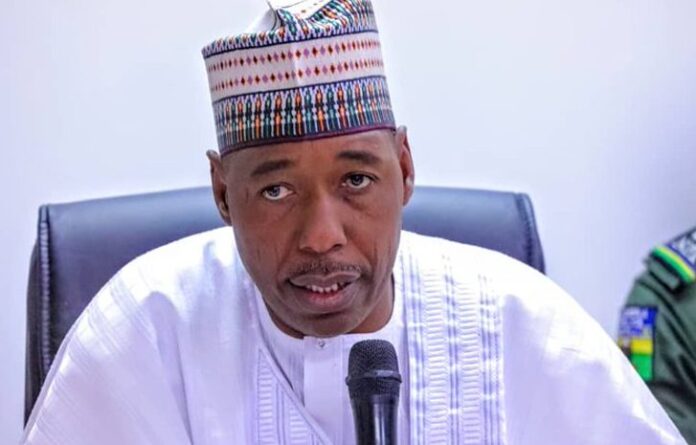Borno State Governor, Babagana Umara Zulum, has called on the Nigerian Armed Forces to launch a major, well-coordinated offensive against Boko Haram and Islamic State West Africa Province (ISWAP) strongholds across key locations in the North-East. The governor made the appeal on Monday during a visit by the Chief of Air Staff, Air Marshal Sunday Aneke, to the Government House in Maiduguri.
Zulum said the time had come for the military to carry out a full-scale operation in the Tumbus Islands of the Lake Chad Basin, the Sambisa Game Reserve, and the Mandara Hills—three areas he described as long-standing hideouts for insurgents. These places, he noted, continue to serve as bases for planning attacks, storing weapons, and regrouping after military operations.
During the meeting, Governor Zulum expressed particular concern about the Tumbus, a network of small islands and marshy lands within the Lake Chad Basin. The area, shared by Nigeria, Chad, Niger, and Cameroon, has been a difficult terrain for security forces for many years because of its vast waterways, remote settlements, and challenging geography.
Zulum said despite the strategic importance of the area, a major joint offensive involving the Nigerian Navy, Air Force, and Army has never been fully launched to clear the Tumbus.
“I want to bring to your kind notice that a thorough military operation involving the Navy, Air Force and Army, purposely intended to rid us of the Tumbus, has never been conducted,” he said. “If we want to bring down insurgency and terrorism in Nigeria, we must address the challenges we are facing in Lake Chad. The area has provided a safe haven for the terrorists; this is our major problem now.”
The governor also pointed out that the Sambisa Game Reserve once a national wildlife sanctuary but now a major terrorist hideout—remains a serious threat. Despite years of military operations in Sambisa, Boko Haram and ISWAP fighters continue to return to the forest because of its size and dense cover.
Sambisa Forest, which stretches across Borno into parts of Yobe and Adamawa, became globally known in 2014 following the abduction of the Chibok schoolgirls. Since then, it has been one of the most fortified insurgent bases in Nigeria.
Zulum warned that unless Sambisa is permanently cleared and effectively secured, insurgents will continue to launch surprise attacks on communities and security outposts.
He added that the Mandara Hills, located along the Nigeria–Cameroon border, also require urgent attention. The rocky terrain, with deep valleys and caves, has been used for years by terrorists and smugglers. The hills provide natural protection for fighters, making it difficult for ground forces to access some high-altitude areas.
The governor urged the Nigerian Air Force to deploy additional Unmanned Aerial Vehicles (UAVs) to the North-East to improve intelligence gathering, surveillance, and precision strikes. According to him, more drones will enhance the military’s ability to monitor difficult terrains like the Tumbus and detect terrorist movements before attacks occur.
“The use of UAVs has proven to be effective,” he said. “We need more of them in the North-East theatre.”
Zulum also proposed that the military organise a high-level strategic meeting in Maiduguri. This meeting, he said, should bring together commanders and top officers from the Army, Navy, and Air Force to reassess current operations and examine new approaches to ending the insurgency.
For more than 14 years, Borno State has been the epicentre of the Boko Haram conflict, which has claimed thousands of lives and displaced more than two million people. While military operations have significantly weakened the insurgents compared to their earlier strength, scattered attacks, ambushes, and bombings still occur in rural areas.
Governor Zulum expressed appreciation to President Bola Ahmed Tinubu for his continued support to the military and for approving new equipment and resources for counter-insurgency operations. However, he appealed for increased funding to enable the armed forces to purchase modern hardware and sustain long-term operations.
He highlighted that the fight against Boko Haram and ISWAP cannot be won with outdated or inadequate equipment, especially in challenging terrains like the Lake Chad Basin.
Earlier in the meeting, Air Marshal Sunday Aneke described Borno as a strategic location in Nigeria’s security architecture. He said its borders and proximity to the Lake Chad Basin make it important not only for the North-East but for the entire country.
Aneke noted that the Nigerian Air Force (NAF) is currently prioritising operational readiness, better coordination with ground forces, and more effective use of airpower across the region. He said air support remains vital to stabilisation efforts, especially in areas that are difficult for ground troops to enter.
“We understand the challenges facing this region, and we are working to improve our operations,” he said. “Our focus is on improved intelligence, integration of air and ground operations, and effective deployment of our assets.”
The insurgency in the North-East began around 2009 when Boko Haram launched violent attacks against government institutions, security forces, and civilians. The group later split into factions, including ISWAP, which has carried out major attacks in the Lake Chad region.
Military operations have dislodged the terrorists from many of their former strongholds, including major towns they once controlled. However, pockets of fighters remain active in forests, border zones, and riverine areas.
The Nigerian military has recorded several successes in recent years, including airstrikes that eliminated key commanders, rescue missions that freed abducted persons, and operations that destroyed weapons stores and camps. But the vastness of the terrain and the movement of insurgents across borders continue to pose challenges.
Zulum’s call for a major offensive follows increasing pressure from communities for stronger military action. Many rural residents say they remain vulnerable to surprise attacks, especially in areas near the Lake Chad shores.

